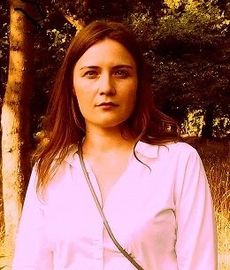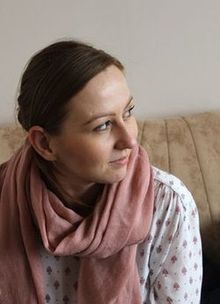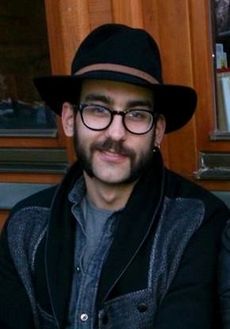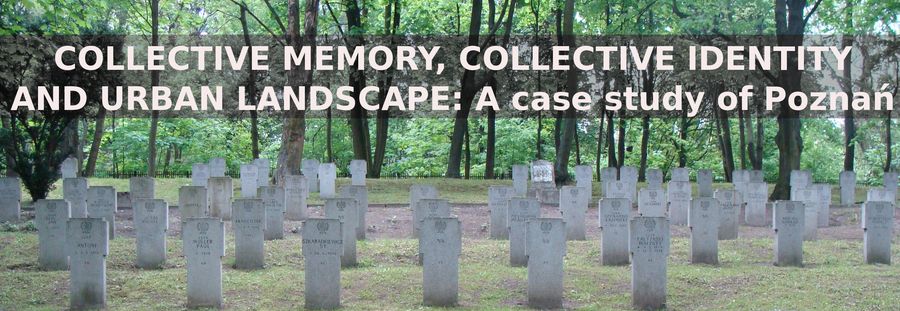 Martyna Borowicz – is a researcher in the present project. She has an M.A. degree in Romance Philology, works as a translator of French texts about the liberal arts.
Her ethnological research focuses on collective memory, identity and cultural landscape. Her publications (in Polish) concern oral history and the (non)memory of Jewish work camp in Poznań.
Martyna Borowicz – is a researcher in the present project. She has an M.A. degree in Romance Philology, works as a translator of French texts about the liberal arts.
Her ethnological research focuses on collective memory, identity and cultural landscape. Her publications (in Polish) concern oral history and the (non)memory of Jewish work camp in Poznań.
 Marta Gruszecka, MA - a graduate at the Faculty of English at Adam Mickiewicz University in Poznań, Marta Gruszecka is currently working on her PhD thesis investigating collective memory of traumatic events. In her research she analyses corpora gathered from media using both traditional methods grounded in Critical Discourse Analysis as well as new computational tools for data analysis (for example the text network analysis method used in Marta Gruszecka, Michal Pikusa “Using Text Network Analysis in Corpus Studies — A Comparative Study on the 2010 TU-154 Polish Air Force Presidential Plane Crash Newspaper Coverage”). Her research interests focus on the issues of collective memory, commemoration and social psychology, not only in reference to language studies but also commemoration in the context of urban spaces (Marta Gruszecka, Tomasz Michalik “Przyjemne miejsca trudnej pamięci. O kiczu martyrologicznym na przykładzie skansenu w Szymbarku”).
Marta Gruszecka, MA - a graduate at the Faculty of English at Adam Mickiewicz University in Poznań, Marta Gruszecka is currently working on her PhD thesis investigating collective memory of traumatic events. In her research she analyses corpora gathered from media using both traditional methods grounded in Critical Discourse Analysis as well as new computational tools for data analysis (for example the text network analysis method used in Marta Gruszecka, Michal Pikusa “Using Text Network Analysis in Corpus Studies — A Comparative Study on the 2010 TU-154 Polish Air Force Presidential Plane Crash Newspaper Coverage”). Her research interests focus on the issues of collective memory, commemoration and social psychology, not only in reference to language studies but also commemoration in the context of urban spaces (Marta Gruszecka, Tomasz Michalik “Przyjemne miejsca trudnej pamięci. O kiczu martyrologicznym na przykładzie skansenu w Szymbarku”).
 Tomasz Michalik, MA – is a PhD student of the Language, Society, Technology and Cognition programme conducted at the Faculty of English Adam Mickiewicz University. He graduated in archaeology at the Institute of Prehistory AMU. Currently he also completes his studies in cognitive science (Institute of Psychology AMU). In his PhD thesis he discusses the issue of using different methods of presenting the past and the influence of different data forms on the formation of knowledge about the past. In the present project he is responsible for the collection of press releases concerning Poznan cemeteries and the preliminary archive research. He is the author of several scientific articles and a reportage "Cleaning the Holocaust" [in Polish], which was released by the publishing house Scholar.
Tomasz Michalik, MA – is a PhD student of the Language, Society, Technology and Cognition programme conducted at the Faculty of English Adam Mickiewicz University. He graduated in archaeology at the Institute of Prehistory AMU. Currently he also completes his studies in cognitive science (Institute of Psychology AMU). In his PhD thesis he discusses the issue of using different methods of presenting the past and the influence of different data forms on the formation of knowledge about the past. In the present project he is responsible for the collection of press releases concerning Poznan cemeteries and the preliminary archive research. He is the author of several scientific articles and a reportage "Cleaning the Holocaust" [in Polish], which was released by the publishing house Scholar.
Michalik T. (2011) Piękny obóz. Stutthof – myślenie w kategoriach estetyki. [w:] Wosińska M., Banaszek Ł. (red.) Sztutowo czy Stutthof? Oswajanie krajobrazu kulturowego. Poznań-Sztutowo, s. 145-158.
Michalik T. (2013) Sprzątając Zagładę. [w:] Bloch N., Brzezińska A. (red.) Sztutowo/Stutthof. Gdzieś między plażą a obozem. Warszawa, s. 31-40.
Kajda K., Michalik T. (2014) Made in Sachsenhausen. Rekontekstualizacja i reapropriacja odwróconego różowego trójkąta wśród grup gejowsko-lesbijskich w Ameryce Północnej jako przykład kradzieży symbolicznej. Interalia. Artykuły bieżące.
Gruszecka M., Michalik T. (2014) Przyjemne miejsca trudnej pamięci. O kiczu martyrologicznym na przykładzie skansenu w Szymbarku. Zeszyty Naukowe KUL nr 56: 2-3, s. 69-80.
Michalik T. (2014) Between the eye and mind. Technology, cognition and knowledge development – eye tracking study report. Palmer R. (red.) AARG News, t. 48, s. 24-34.
 Aleksandra Paprot, MA, is the researcher in the project. She graduated in Cultural Studies and in ethnology. She is a PhD candidate in the Institute of Ethnology and Cultural Anthropology of Adam Mickiewicz University in Poznań. In her PhD thesis she deals with the creation of contemporary regional and local identity in Western and Northern Lands (based on the example of Żuławy and Powiśle). She is particularly interested in issues of the cultural heritage i.e. protestant cemeteries before 1945 in Żuławy. In her research she dealt with the social context of the functioning of these necropolis including: social memory, the attitude to cultural heritage and cultural landscape, as well as mechanisms of cultural adaptation. In 2012 she took part in a facultative course on “Polish, German and Jewish Memory in Greater Poland” AMU, conducted a study in Buk on memory and non-memory among the town inhabitants (also in the context of the existence of the Evangelical and Jewish cemetery in the urban space). In the academic year 2013/2014 during summer semester, she led facultative course for students of ethnology titled "Cemetery as a socio- cultural space". She is also an author of the book titled:
”Stara Kościelnica. History of the Village in Żuławy” [in Polish] Scientific Publishing House SCHOLAR
Aleksandra Paprot, MA, is the researcher in the project. She graduated in Cultural Studies and in ethnology. She is a PhD candidate in the Institute of Ethnology and Cultural Anthropology of Adam Mickiewicz University in Poznań. In her PhD thesis she deals with the creation of contemporary regional and local identity in Western and Northern Lands (based on the example of Żuławy and Powiśle). She is particularly interested in issues of the cultural heritage i.e. protestant cemeteries before 1945 in Żuławy. In her research she dealt with the social context of the functioning of these necropolis including: social memory, the attitude to cultural heritage and cultural landscape, as well as mechanisms of cultural adaptation. In 2012 she took part in a facultative course on “Polish, German and Jewish Memory in Greater Poland” AMU, conducted a study in Buk on memory and non-memory among the town inhabitants (also in the context of the existence of the Evangelical and Jewish cemetery in the urban space). In the academic year 2013/2014 during summer semester, she led facultative course for students of ethnology titled "Cemetery as a socio- cultural space". She is also an author of the book titled:
”Stara Kościelnica. History of the Village in Żuławy” [in Polish] Scientific Publishing House SCHOLAR
and over 20 academic articles, among them:
Mennonite Necropolis in Stogi Malborskie as a Source of Tradition and Information about the Former Inhabitants of Żuławy [in Polish] University of Gdańsk Publishing House
German Cultural Heritage - Houses, Churches and Cemeteries in the Memories of the Oldest Inabitants of Żuławy [in Polish]
The Postwar Fate of Mennonite and Protestant Cemeteries in Żuławy Elbląskie [in Polish]
 Mikołaj Smykowski, MA is an anthropologist, a PhD student at the Faculty of History, Institute of Ethnology and Cultural Anthropology of Adam Mickiewicz University in Poznań. His research interests focus on field work in the former concentration camps (Stutthof) and extermination camps (Kulmhof). He is particularly interested in individual and collective memory of the postwar landscapes transformations, second life of objects connected with Jewish culture and with the profanation of places of collective memory. In his research he combines an analysis of biographic narratives with the study of landscape and material programmes in historical museums and the recycling and re-use of artifacts from the former concentration camps. The list of selected publications is given on the Polish version of this site.
Mikołaj Smykowski, MA is an anthropologist, a PhD student at the Faculty of History, Institute of Ethnology and Cultural Anthropology of Adam Mickiewicz University in Poznań. His research interests focus on field work in the former concentration camps (Stutthof) and extermination camps (Kulmhof). He is particularly interested in individual and collective memory of the postwar landscapes transformations, second life of objects connected with Jewish culture and with the profanation of places of collective memory. In his research he combines an analysis of biographic narratives with the study of landscape and material programmes in historical museums and the recycling and re-use of artifacts from the former concentration camps. The list of selected publications is given on the Polish version of this site.
 Polska wersja
Polska wersja


